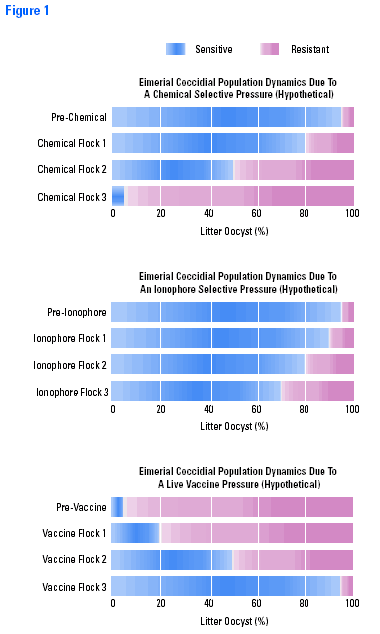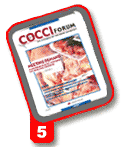Technically Speaking
The Effects of Selection Pressure on Eimeria Populations
 Rick Phillips, DVM
Director, Worldwide Technical
Service, Poultry
Schering-Plough Animal Health
Corporation
|
Coccidiosis of poultry is caused
by intracellular protozoan parasites
belonging to several
species of the genus Eimeria. As poultry
producers know, coccidiosis can
significantly impair growth rate, feed
utilization and flock uniformity.
Coccidia organisms have a complex
life cycle. There is a portion inside the
bird (endogenous) and a portion outside
(exogenous) in the litter/environment.
Selection pressure
All living organisms, including protozoa,
are influenced by their environment.
This environmental influence is
referred to in biology as selection pressure.
Selection pressure can be natural or
man made. When applied to a given
biological population, it can give certain
species or strains in that population
an advantage or disadvantage to their
survival and reproductive capabilities.
All living creatures are under a constant
natural selection process. In mammals,
selection pressure occurs slowly
over thousands of years due to the relatively
slow generation time. In the rapidly
proliferating world of microorganisms
such as bacteria, viruses and protozoa,
however, selection pressures can
have a profound rapid effect on population
dynamics.
To truly understand and predict the
population's behavior, analysis of these
populations is a quantitative discipline
and mathematical models are required.
Unfortunately, no specific model has
been developed to predict the behavior
of the Eimeria population in today's
poultry production units.
On the other hand, there is a
tremendous amount of scientific data
that enables basic predictions to be
made about how Eimeria behave in a
controlled environment with defined
conditions or pressures, such as a poultry
house.
Two major selection pressures
placed on the Eimeria population in
today's production facilities include
host immunity and anticoccidial programs,
such as live coccidial vaccines
and drugs.
1. Host immunity
 |
The immune system response of poultry
to coccidial parasites is complex.
Both cell-mediated and antibody
immune responses are activated during
a coccidial challenge; yet, the cell-mediated
immune response plays a larger
role in disease resistance.
The host immune system is a naturally
occurring selection pressure that
constantly influences the dynamics of
the coccidia population in poultry
houses. Less immunogenic coccidial
species and strains that have the ability
to evade the host immune system will
have a higher survival percentage over
the life of the flock. The immune
response can vary greatly between different
poultry breeds and/or strains.
This is why the breed/strain, age and
sex of the host (bird) can have a dramatic
effect on the level of coccidia that
is shed in a poultry house.
2. Anticoccidials
Synthetic chemicals: Synthetic chemicals,
especially the highly effective
ones, place strong selection pressure
on coccidia populations in poultry
houses.
Ironically, synthetic chemicals are
too effective with respect to long-term
control of coccidia populations in poultry
facilities. Coccidial strains most sensitive to the drug are not allowed to
replicate in the gut of the bird, allowing
the resistant and/or less drug-tolerant
species or strains to rapidly multiply
without natural competition (Figure 1).
This rapid selection for natural
resistant strains prevents the continuous
use of synthetic chemicals in a poultry
operation. When resistance is low to an
effective synthetic chemical, maximum
flock performance may be realized with
respect to good coccidial control.
Polyether ionophores: In contrast,
polyether ionophores are not as effective
in coccidia control as an effective
synthetic chemical. They place less
selection pressure on the coccidial population,
allowing for some coccidial
replication or shedding to occur.
With the ionophores, there is
enough replication of coccidia to allow
the host immune system to respond
effectively. The long-term success of
the ionophores has been due to this
simple yet complex scenario.
Live vaccines: Once a shift occurs in a
coccidial population from drug-sensitive
to drug-resistant/tolerant, it may
take many years or growing cycles
before the coccidial population has the
opportunity to naturally shift back to its
original state once the anticoccidial
product is removed/rotated. However,
the use of effective live, drug-sensitive
coccidial vaccines shortens the time it
takes for a population to shift back.
Live coccidial vaccines, by nature,
place selection pressure on an existing
coccidial population in the poultry
house. When applied appropriately,
live coccidial oocysts will replicate and
replace drug resistant/tolerant field
strains. Over a relatively short period of
time, the coccidial population will shift
to more sensitive strains.
Summary
In order for poultry integrators to maximize
flock performance, a good understanding
of the two key selection pressures
mentioned above "host immunity
and anticoccidials "is imperative.
Adding drug-sensitive, live coccidial
vaccines in rotation with conventional
coccidiostats will help the industry
maximize product efficacy and coccidial
control.
Source: CocciForum Issue No.5, Schering-Plough Animal Health.







